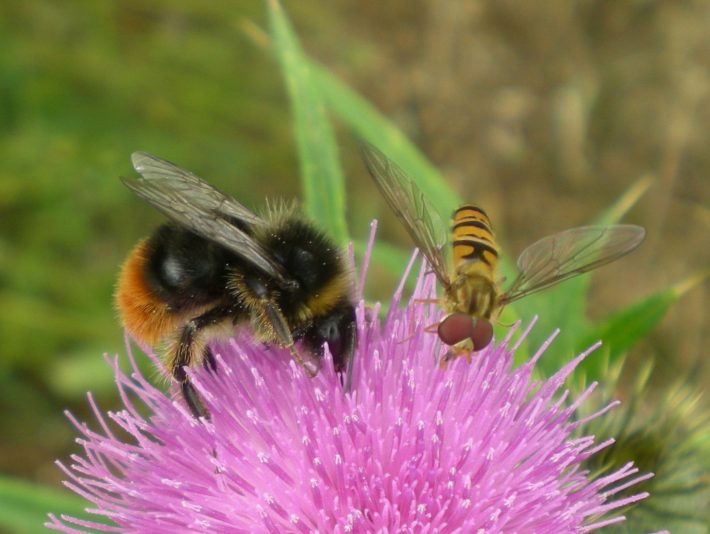Don’t forget about the (other) bees…
When bees are mentioned, for the vast majority of people the honeybee springs to mind.

The honey bee has a huge part in our lives; in terms of the food (and honey) we eat, culture through music and film, and a long and interconnected history. Research published this year found residues of beeswax from pots as far back as the seventh-millennium cal BC, showing our close relationship with honeybees has persisted for millennia.
Honeybees are native to Europe and Africa, but have been transported globally for both honey production and pollination. 20th August marks honeybee day in the US, a day dedicated “to build community awareness of the (honey) bee industry, through education and promotion”. There is a wide programme of events aimed at educating the general public about the honeybee.
Wild bee diversity
But the honeybee is not alone. In fact, there are about 20,000 species of bee worldwide and 250 species in the UK alone! These include both social (for example bumblebees) and solitary species. Despite this, the majority of people only know and identify with honeybees. As a researcher who works on pollination, most conversations with family and friends end up reverting to beekeeping and honey eating. A recent “quiz” initiated by Friends of the Earth even found that most participants are unable to even distinguish between a honeybee (Apis mellifera) and a wild bumblebee (Bombus sp)
As most people only identify with the honeybee, the importance of wild bees is often overlooked. Wild bees are important too, and a recent study has shown that the contribution of wild bees to global crop pollination is about equal to that of the honeybee. For some crops in particular (for example those requiring a special buzz pollination mechanism such as blueberry or tomato) wild bees are more effective than honeybees in terms of their value as pollinators. Saying this, it’s not even all about the bees; flies and other pollinator groups also play an important, and often unrecognised, role as pollinators (). And then of course there’s the pollination of wild plants; although we are beginning to understand the relative contribution of honeybees to crop pollination, we still don’t fully understand how important honeybees are in wild plant communities. With concerns over honeybee health, and phenomena such as colony collapse disorder, wild bees and other pollinators play an increasingly important role in sustaining the delivery of pollination services.
Wild bees versus honey bees
The dominance of the honeybee in the public eye has caused some push back, and many programmes focussed on wild pollinators specifically exclude honeybees as they are managed and, in many parts of the world including the US, non-native. Many pollination studies also omit honeybees due to their domesticated status. But honeybees are present and they are important, in particular in areas of the world where wild bee populations are no longer sustained and cannot deliver sufficient pollination services, and they need to be protected too. There’s already even a kick back from the honeybee lobby; a campaign on the National Honey bee day website aims to “ban the native pollinator label” which promotes conservation for native wild bees, but excludes the honeybee as it is a non-native and managed species
So on this National Honeybee Day, let us not only think of the relative merits of different pollinator taxa, but also the importance of all pollinators. Together, they provide crucial pollination services needed for food production and the health of natural ecosystems and we need to do what we can to help them. But more than that – we also have a moral obligation to conserve them.
Want to help the bees? The All Ireland Pollinator Plan has just published a series of guidelines on how you can help, including what you can do for pollinators in your garden.
For an animation on different types of bees and the threats they face (from the Bartomeus lab)
Like what we stand for?
Support our mission and help develop the next generation of ecologists by donating to the British Ecological Society.